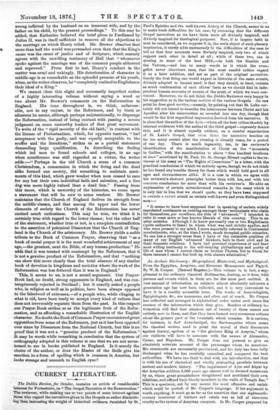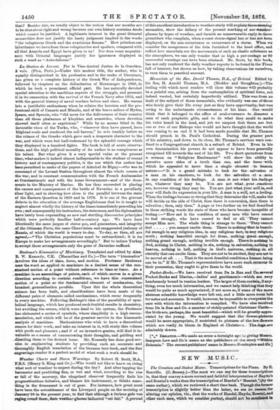An Archaic Dictionary: Biographical, Historical, and Mythological. From the Egyptian,
Assyrian, and Etruscan Monuments and Papyri. By W. R. Cooper. (Samuel Bageter.)—This volume is, in fact, a sup- plement to the ordinary classical dictionaries, dealing, as it does, with persons and events which in them are for the most part omitted. A vast amount of information on subjects almost absolutely unknown a generation ago has now been collected, and it is very convenient to have it in a readily accessible form. The works of Assyriologists, Egyptologists, d:o., are numerous, and often out of reach. Mr. Cooper has collected and arranged in alphabetical order under each name the essence of the information which they give. Readers of ordinary in- formation will find that nineteen out of twenty of these names are entirely new to them, and that they have formed very erroneous notions about the greater part of the twentieth which remains. It is curious, for instance, to find Assurbanipal, the Sardanapalus whose name the classical writers used to point the moral of their discourses against luxury, spoken of as "the glorious King of Assyria," whom our children will have to associate with the names of Alexander, Ca3sar, and Napoleon. Mr. Cooper does not pretend to give an absolutely accurate account of the personages whom he mentions. His statements are necessarily provisional, and his duty has been fully discharged when he has carefully consulted and compared the best authorities. We have one fault to find with his introduction, and that is with his use of rhetorical and wholly misleading parallels between ancient and modern history. "The impalement of Aym and Abyat by the Assyrian soldiers 4,000 years ago cannot well be deemed monstrous by us, whose great-grandfathers slaughtered and mutilated their own relations, and affixed their bloody members to the walls of Temple Bar." This is a specimen, not by any means the most offensive and unfair which could be quoted, of Mr. Cooper's language. If his argument is worth anything, It must go as far as the assertion that our eighteenth- century treatment of traitors and rebels was as full of atrocious cruelty as the system of Assyrian conquest. Is Mr. Cooper prepared for
that? Besides this, we totally object to the notian that our months are to be shut about right and wrong because our own history contains deeds which cannot be justified. A legitimate interest in the great Oriental monarchies does not justify the hasty judgment implied in the words "the voluptuous Greek and the avaricious Roman." How priceless our inheritance we have from these voluptuaries and spoilers, compared with all that Assyria and Egypt have given to us! Nor does some acquaint- ance with Oriental languages justify the ignorance displayed in such a word as " Autochthoane."







































 Previous page
Previous page